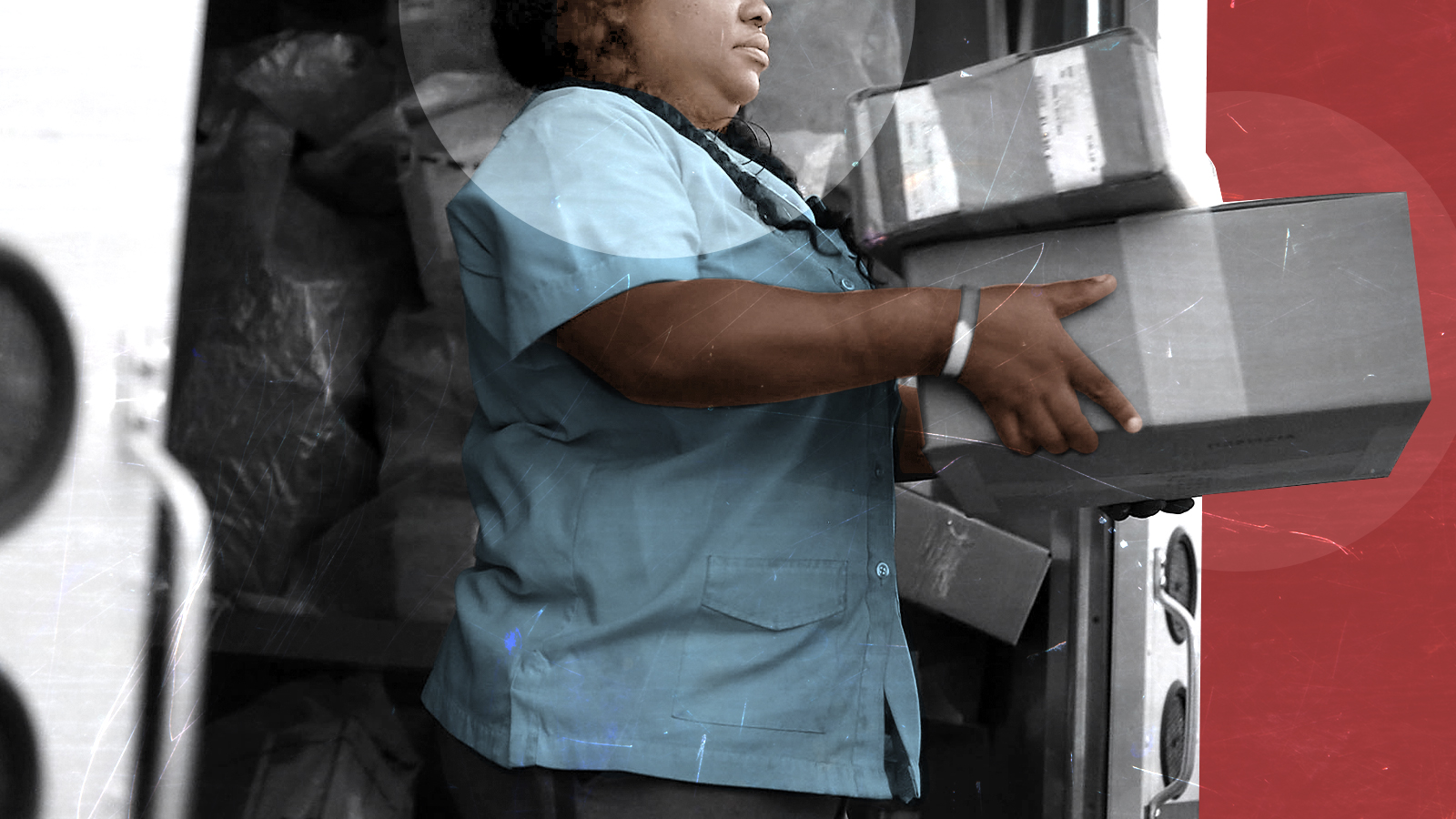The Postal Service is under siege. Black workers stand to lose the most.
The USPS has historically been known to benefit Black people in terms of social mobility and accessing the middle class


A free daily email with the biggest news stories of the day – and the best features from TheWeek.com
You are now subscribed
Your newsletter sign-up was successful
Much as I understand and relate to the pain of standing in what feels like the longest line ever invented at the Post Office, and wanting to cry out to the universe asking what one has done to endure such pain and poor customer service, I want the United States Postal Service to go on existing, and despair at the damage being inflicted upon it.
The USPS is one of the oldest and most consistent institutions this country, and an essential service, handling 47 percent of the world's mail. It's also under siege. It was not designed to turn a profit, yet in 2018, a task force created by former President Donald Trump labeled the Postal Service's financial path "unsustainable," and recommended changes that would push the post closer to complete privatization. In a memo, Trump-appointee Postmaster General Louis DeJoy said the service operates on a "broken business model" and that "without dramatic change there is no end in sight and we face an impending liquidity crisis."
As part of his 10-year plan for dramatic change, the USPS will reportedly lengthen its delivery time for about 30 percent of its volume. And this has already begun. As early as this past weekend, millions of Americans found themselves subjected to even more delays from an already struggling USPS. For a lot of people, it's not just packages of candles, clothes, and snacks that won't arrive on time — it's also their medicine. In other words, DeJoy is playing with people's lives in the pursuit of profit.
The Week
Escape your echo chamber. Get the facts behind the news, plus analysis from multiple perspectives.

Sign up for The Week's Free Newsletters
From our morning news briefing to a weekly Good News Newsletter, get the best of The Week delivered directly to your inbox.
From our morning news briefing to a weekly Good News Newsletter, get the best of The Week delivered directly to your inbox.
But the undermining of the USPS is a real crisis not only for mail delivery, but for Black workers.
The USPS has historically been known to benefit Black people in terms of social mobility and accessing the middle class. In There's Always Work at the Post Office: African American Postal Workers and the Fight for Jobs, Justice, and Equality," published in 2010, author Philip F. Rubio, a history professor at North Carolina A&T State University, wrote that not only has the post office "been vital to Black community development, but Black postal worker activism changed the Post Office and its unions."
Robert Zieger, emeritus professor of history at the University of Florida in Gainesville, said, "There's a long tradition of the public sector being more friendly, or less hostile, to African-American workers. The Post Office is the best example."
The GOP expressed open hostility toward USPS at the expense of the Black worker long before Trump did. After all, it was former President George W. Bush and a Republican-controlled Congress that passed the Postal Accountability and Enhancement Act, which required the post office to calculate all of its retiree pension and health-care costs for the next 75 years — including for people it hadn't even hired yet — and put away enough over the next 10 years to cover them. As a Business Insider discussion on the rise and fall of the USPS explained, "That'd be like you only working from age 18 to 28 and then expecting to live on that income until you were 103 years old."
A free daily email with the biggest news stories of the day – and the best features from TheWeek.com
These changes resulted in hundreds of thousands of jobs being cut since then. And Black postal workers specifically have been worried for well over a decade. In a 2013 Reuters article, postal worker Lakesha Dortch-Hardy noted, "These jobs are the middle class ... Without this job, I don't know where I'd be right now."
Trump and fellow Republicans may claim they only want to fix a broken business model, but there's a more nefarious reason the Trump administration sought to break the USPS: to control the 2020 election outcome. In an interview last summer with Fox Business Network's Maria Bartiromo, Trump all but admitted he was intentionally blocking federal funding to the U.S. Postal Service to discourage the use of mail-in ballots in November's elections. "Now, they need that money in order to make the post office work, so it can take all of these millions and millions of ballots," Trump explained. "Now, if we don't make a deal, that means they don't get the money," he added. "That means they can't have universal mail-in voting, they just can't have it."
While that scheme might not have worked out, Trump's appointee is still managing to follow the Trump template of making sure Black people pay an even greater cost of their corrupt policies. In the same way he tilted the Supreme Court to the right and toppled many of our national norms, it's starting to feel like we are on the verge of Trump once again successfully pushing long standing Republican positions to the finish line. I need more to care about that, because when I think of the Post Office, I don't think of just long lines, but family members that I know who have worked and continue to work for the USPS. Some of whom served this country, returned to many of the same problems any Black person living in America tends to endure, but managed to find stability by serving people through a job with the Post Office.
Unless DeJoy is ejected and Democrats do more, I'm afraid that soon we'll only be able to talk about the pivotal role the Post Office has played in the lives of the Black worker in past tense.
Michael Arceneaux is the New York Times-bestselling author of I Can't Date Jesus and I Don't Want to Die Poor.
-
 6 exquisite homes with vast acreage
6 exquisite homes with vast acreageFeature Featuring an off-the-grid contemporary home in New Mexico and lakefront farmhouse in Massachusetts
-
 Film reviews: ‘Wuthering Heights,’ ‘Good Luck, Have Fun, Don’t Die,’ and ‘Sirat’
Film reviews: ‘Wuthering Heights,’ ‘Good Luck, Have Fun, Don’t Die,’ and ‘Sirat’Feature An inconvenient love torments a would-be couple, a gonzo time traveler seeks to save humanity from AI, and a father’s desperate search goes deeply sideways
-
 Political cartoons for February 16
Political cartoons for February 16Cartoons Monday’s political cartoons include President's Day, a valentine from the Epstein files, and more
-
 Epstein files topple law CEO, roil UK government
Epstein files topple law CEO, roil UK governmentSpeed Read Peter Mandelson, Britain’s former ambassador to the US, is caught up in the scandal
-
 Iran and US prepare to meet after skirmishes
Iran and US prepare to meet after skirmishesSpeed Read The incident comes amid heightened tensions in the Middle East
-
 Israel retrieves final hostage’s body from Gaza
Israel retrieves final hostage’s body from GazaSpeed Read The 24-year-old police officer was killed during the initial Hamas attack
-
 China’s Xi targets top general in growing purge
China’s Xi targets top general in growing purgeSpeed Read Zhang Youxia is being investigated over ‘grave violations’ of the law
-
 Panama and Canada are negotiating over a crucial copper mine
Panama and Canada are negotiating over a crucial copper mineIn the Spotlight Panama is set to make a final decision on the mine this summer
-
 Why Greenland’s natural resources are nearly impossible to mine
Why Greenland’s natural resources are nearly impossible to mineThe Explainer The country’s natural landscape makes the task extremely difficult
-
 Iran cuts internet as protests escalate
Iran cuts internet as protests escalateSpeed Reada Government buildings across the country have been set on fire
-
 US nabs ‘shadow’ tanker claimed by Russia
US nabs ‘shadow’ tanker claimed by RussiaSpeed Read The ship was one of two vessels seized by the US military
